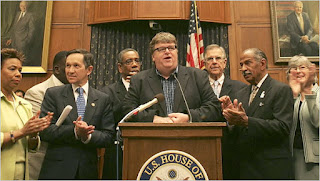
We have, in Paradise, a very good writer named Jamie O'Neill, whose article in the Paradise Post this morning is called "Get rich, get elected or don't get sick."
Apparently, Mr. O'Neill was as impressed as I was by Michael Moore's new movie, "Sicko," which compares the American health care system with countries like Canada, Great Britain, France, and Cuba, which practice universal health care. He frames his article this morning with the powerful scene from that movie where Moore is interviewing Americans who now live in France, gushing about the life they live there as compared to life in the States.
O'Neill writes: "Those advantages include no-charge-to-the-patient house calls from doctors when patients get sick in the middle of the night, plus freedom from the fear all Americans live with as we wait for the catastrophic illness that will either drive us to bankruptcy, or make us uninsurable, or even get our treatment denied as cost-conscious HMOs or insurance carriers look for ways to refuse payment for certain expensive medical procedures."
In our system, where politicians are bought and paid for by the richest amongst us, there are no curbs against health care industry abuse.
Again, O'Neill writes: "Our health care system is a mess, and most of us know this up close and personal. Co-pays increase steadily, pharmaceutical costs are wholly untethered from real value, and the number of uninsured fellow citizens grows each day. Even those of us fortunate enough to have insurance are not well served. As Moore's film makes clear, lots of middle class working people who thought they were covered have found their claims denied, or have been put through the wringer by insurance company indifference to their health problems as corporate minions sought ways to limit treatment."
Conservatives build their arguments on fears that the government helping people is a form of wicked "socialism," and we can't have any of that.
O'Neill counters: "But, as Michael Moore's movie points out, we wouldn't entrust police and fire safety to the private sector, leaving accountants in charge of deciding which emergency calls were covered or cost effective. Nonetheless, we've gotten used to having the health and safety of those we love being determined by people whose eyes are fixed firmly on the bottom line."
This is the problem with privatization. There are many things that we depend on as a people that can't be entrusted to the lowest bidders.
Finally, O'Neill observes: "In Michael Moore's movie, one of those Americans in Paris observes that in France, the government seems to fear the people, but in America the people fear the government. That would seem to be why the French people have a government so much more responsive to their needs than we've had of late. Politicians here seem to no longer fear being caught in lies, deceptions, or plain rip offs of taxpayer money. After all, the public has become so quiescent and sheeplike, so easy to fool, we're not likely to do anything at all about any outrage the government commits."'
Tara and I had a discussion with a friend, after seeing "Sicko" together, about this implication that the government fears the people in France, while we fear our government. I agree with Mr. O'Neill about the government getting away with pretty much anything it wants to do now. I wasn't sure, however, that we could say it's because we fear the government. The implication in that statement is that the government's authority is so powerful and tyrannical that we are cowering beneath their oppressive weight. While I'll admit that there are warning signs that it could easily go that way, I don't think we're there yet. But there seemed like there was truth in this remark by the American in France. But reflecting on it after reading it in Mr. O'Neill's column, I have a different understanding of it. Americans have come to the point where they have bought into an ideology that fears the concept of government. We have bought into an ideology that says any kind of government must be bad, and must be slashed or gutted to the point of ineffectiveness. The exception, of course, is the military and police force, built up because of the feeding of fears, but that's another discussion. America fears what Ronald Reagan called "Big Gov'ment," and is willing to suffer a whole range of abuses by business in order to avoid the appearance of "socialism." When will we learn that the government is of the people, and for the people, and that it is, as such, a tool to be used to help us?
No comments:
Post a Comment